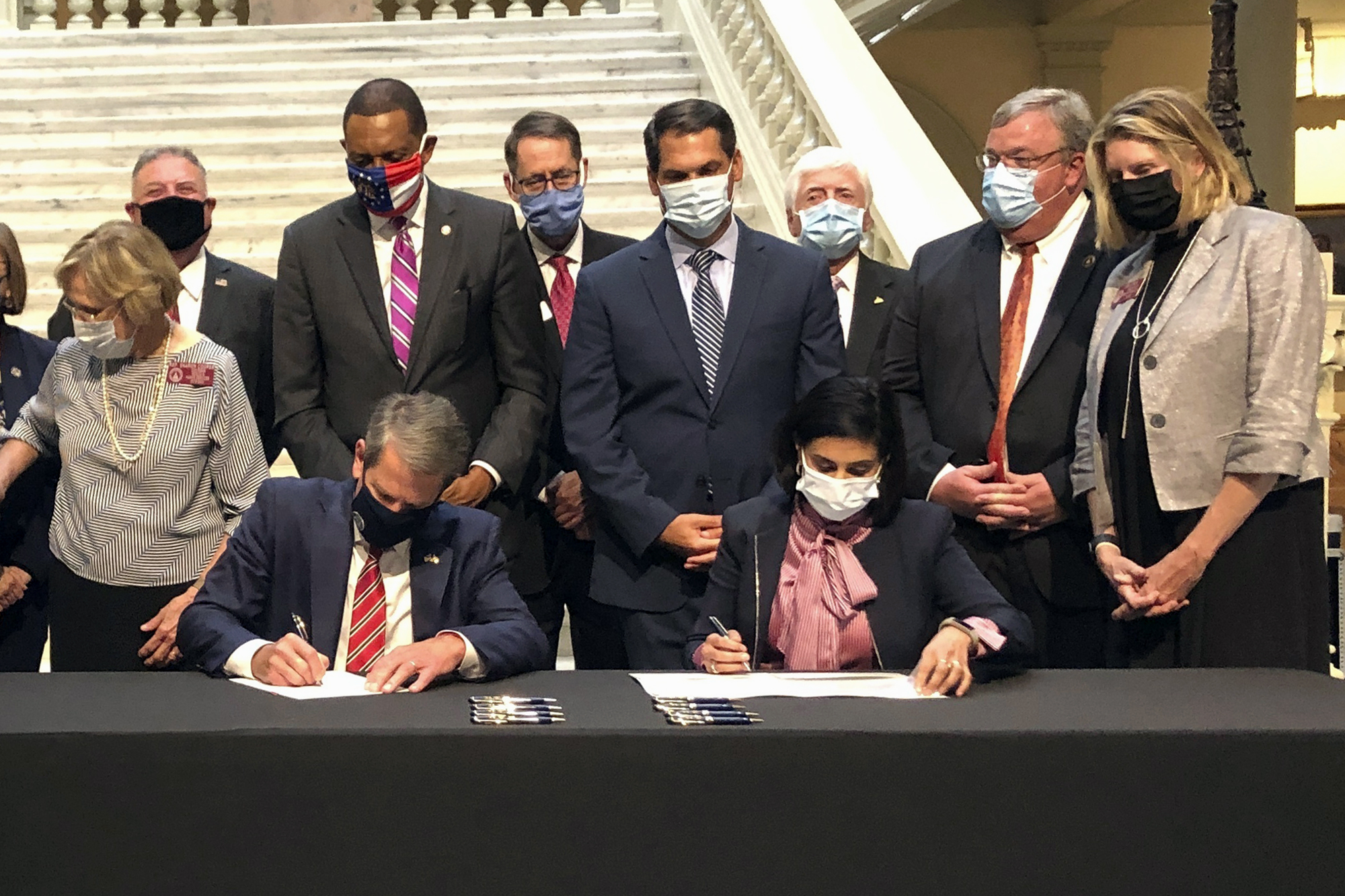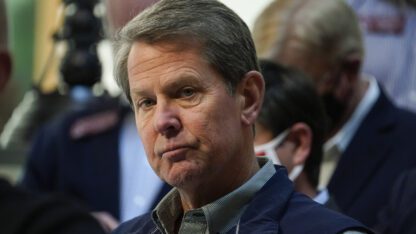At a virtual campaign kickoff this month, an attendee asked gubernatorial candidate Stacey Abrams what separates her healthcare plan from Gov. Brian Kemp’s.
“We live in an industrialized, modern nation, and no one should die from a preventative disease,” Abrams said. “And the fact that we are refusing to help people, not because we can’t, but because he won’t, is the real difference.”
Abrams is referring to Medicaid expansion, a top priority when she ran for governor in 2018 and now a centerpiece of her campaign as she makes a second bid.
Georgia is one of 12 states that has not expanded Medicaid. Now, with the 2022 campaign and a new legislative session underway, Georgia Democrats and Republicans are all jockeying to frame exactly why.
Medicaid helps low-income people get health coverage. In Georgia, low-income children, pregnant people and people with disabilities can access Medicaid, along with a few other groups.
Expanding Medicaid would allow any low-income adult to participate, as long as they make below about 130 percent of the federal poverty line. Medicaid expansion is a provision of the Affordable Care Act, and states have to opt-in to participate. The federal government pays 90% of the cost, and states pick up the rest.
But for years, Georgia’s governors declined, saying it would be too expensive long-term.
Kemp pursues a limited expansion
Then, in 2020, acknowledging Georgia is one of the least-insured states in the country, Kemp promised to take action.
“There’s no doubt this status quo is simply unacceptable,” Kemp said. “It threatens our families and it threatens our state’s future.”
But instead of expanding Medicaid in full, he asked for a waiver from the Trump administration to allow a more limited expansion.
The plan, which Kemp called Georgia Pathways, would cap eligibility at a lower income threshold and cover about 300,000 fewer people. And crucially, the plan included an 80-hour a month work reporting requirement, which could be fulfilled through working, training or volunteering.
And because Georgia was still declining to expand Medicaid in full, the federal government would cover a much smaller chunk of the total cost.
“Georgia Pathways will provide the opportunity for thousands of hard-working Georgians to finally have health insurance coverage,” Kemp said at the time.
Jamila Michener, a professor at Cornell University and expert on Medicaid expansion, says waivers gave Republican governors like Kemp the political cover to participate in a program that’s popular but is associated with President Obama and was created under the Affordable Care Act, or Obamacare.
“So states used waivers as a way to say, ‘Fine we’re going to do this, but we’re going to make it into something that fits into a political profile that we’re much more comfortable with,’” she says.
Kemp’s plan, though, never took effect.
Last month, the Biden Administration denied final approval of the work requirement, saying work requirements don’t have anything to do with Medicaid’s purpose, which is providing healthcare. They offered to work with Kemp on the waiver if the state dropped the work requirement. The state has not agreed.
Michener says reporting work can be a hurdle for low-income people without computers, spare time or tech literacy. Other states attempted to add work requirements during the Trump administration, and many ended up stuck down in the courts.
“The work reporting requirement is essentially a way of limiting the number of people who get covered,” Michener says.
Republicans and Democrats tell different stories
After the Biden administration nixed Kemp’s plan, politicians scurried to shape the narrative.
In a tweet, House Speaker David Ralston, a Republican, called Biden “the grinch” for nixing their healthcare proposal right before Christmas.
Democrats criticized Republicans for not accepting a full Medicaid expansion from the start, which is what Abrams and other Democratic lawmakers have supported for years.
“The Kemp camp says ‘No, no, no, it’s Biden.’ And the Abrams camp says ‘No, it’s Kemp.’ And people can’t make sense of that if they haven’t been following Medicaid politics closely,” Michener says. “It really muddies the water. [Republicans] get to make it look like it’s about politics and it’s not about the fact that these work requirements are actually bad policy.”
Kemp’s administration has pledged to fight the Biden administration’s decision in the courts.
“I think if they take their partisan cap off and just look at it for its merits, they would sign off on the waiver and allow us to go deliver an innovative idea around healthcare that would allow us to expand the way we deliver for people who find themselves in unfortunate gaps in and around poverty,” Lt. Gov. Geoff Duncan told WABE.
Still, Republicans in the state legislature have signaled they don’t intend to make another attempt to deal with Medicaid expansion this session. So for now, many people remain in limbo.
Inside the Medicaid coverage gap
The Kaiser Family Foundation estimates that more than 250,000 Georgians don’t currently qualify for Medicaid or for subsidies to help buy their own insurance. Michener says a bulk of people in this coverage gap are women and people of color.
Amy Bielawski, who lives outside Atlanta, is one person in this gap. She runs a small business providing entertainment like face-painting, balloon-making and belly-dancing at parties and events. And for years, she’s been uninsured.
Bielawski says she can’t afford to shell out hundreds of dollars a month for insurance, so she has to pay out of pocket.
“I found a clinic that’s basically for indigent people, and you can get lab work done and they’ll supply your prescriptions, but it’s not great care,” she says.
But when Bielawski had a health scare a couple of years ago, it was terrifying.
“And not only what was happening to my body, but how much money is this going to cost me,” she says.
What to do for uninsured people like Bielawski is a question voters will face this year, when Georgia’s governor’s office is up for grabs.









